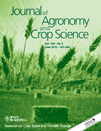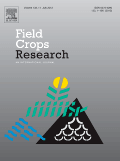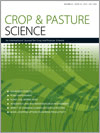
JOURNAL OF AGRONOMY AND CROP SCIENCE
Scope & Guideline
Cultivating knowledge for tomorrow's agricultural challenges.
Introduction
Aims and Scopes
- Crop Stress Responses:
Research on how crops respond to various abiotic stresses such as drought, heat, salinity, and waterlogging, focusing on physiological and biochemical mechanisms. - Nutrient Management and Efficiency:
Studies aimed at improving nitrogen use efficiency and exploring the impacts of nutrient management practices on crop yield and quality. - Genetic and Genomic Studies:
Investigations into the genetic basis of traits related to stress tolerance, yield stability, and quality in various crop species. - Irrigation and Water Management:
Research on irrigation strategies, water use efficiency, and the effects of water availability on crop productivity. - Innovative Agronomic Practices:
Exploration of novel agronomic practices, including the use of plant growth regulators, cover cropping, and soil amendments to enhance crop resilience and productivity. - Climate Change Adaptation:
Studies that assess the impact of climate change on crop production and explore adaptive strategies to mitigate its effects.
Trending and Emerging
- Sustainable Agriculture Practices:
There is a growing interest in sustainable agricultural practices that enhance soil health, biodiversity, and ecosystem services, often integrating organic amendments and conservation tillage. - Smart Agriculture and Precision Farming:
The incorporation of technology in agriculture, including precision farming techniques and smart irrigation systems, is increasingly prominent, highlighting the role of data and automation in improving crop management. - Climate Resilience Strategies:
Research focusing on developing climate-resilient crops and farming practices is gaining attention, addressing the urgent need to adapt to changing climatic conditions. - Functional Genomics and Breeding Technologies:
Emerging techniques in genomics, such as CRISPR and other gene-editing technologies, are becoming central to research aimed at enhancing crop traits for stress tolerance and yield. - Plant-Microbe Interactions:
Studies exploring the beneficial interactions between plants and microbes, including mycorrhizal fungi and plant growth-promoting rhizobacteria, are increasingly featured as a means to enhance crop resilience and productivity.
Declining or Waning
- Traditional Pest Management Techniques:
Research focusing on conventional pest management practices has decreased, possibly due to a shift towards integrated pest management (IPM) and sustainable agriculture. - Soil Microbial Studies:
The frequency of studies specifically targeting soil microbial dynamics and their direct impact on crop performance has waned, as the focus shifts towards more holistic soil health assessments. - Historical Crop Varietal Studies:
Research on historical crop varieties and their agronomic performance is less prominent, with a greater emphasis on modern breeding techniques and genetically modified organisms.
Similar Journals

Revista de la Facultad de Agronomia de la Universidad del Zulia
Innovating Agriculture: Insights from the Heart of VenezuelaWelcome to the Revista de la Facultad de Agronomia de la Universidad del Zulia, a key publication in the fields of Agronomy, Animal Science, Food Science, and Plant Science. Published by the Facultad de Agronomía, Universidad del Zulia, this journal aims to foster academic dialogue and disseminate impactful research that advances knowledge and practice within these disciplines. Operating under the ISSN 0378-7818 and E-ISSN 2477-9407, this journal offers a platform for both emerging and established scholars to share their discoveries and innovations. Despite its challenges, as reflected in its Q4 ranking across multiple categories in 2023, it remains a vital resource for the Venezuelan scientific community and beyond. Readers will benefit from a diverse array of studies and discussions that address contemporary issues in agriculture and related fields, helping inform best practices and policy. Engage with cutting-edge research from Venezuela and contribute to the development of agronomic sciences in the region.

FIELD CROPS RESEARCH
Pioneering Discoveries in Agronomy and Soil ScienceFIELD CROPS RESEARCH is a premier academic journal published by Elsevier, dedicated to advancing knowledge in the fields of Agronomy and Crop Science as well as Soil Science. Now in its 46th year of publication, this esteemed journal has established itself as a leading resource, holding a prestigious Q1 ranking in both the Agronomy and Soil Science categories, with a remarkable blend of rigorous peer-reviewed research and innovative findings. With a Scopus ranking of #27/406 in Agronomy and #20/159 in Soil Science, and a notable 93rd and 87th percentile respectively, FIELD CROPS RESEARCH plays a vital role in informing practices that drive sustainable agriculture and optimize crop production. Although not an open access journal, it remains highly accessible to the global research community and offers critical insights that influence policy and agricultural practices worldwide. Researchers, professionals, and students are encouraged to delve into this journal, as it continues to shape the future of field crop research through impactful studies and comprehensive reviews.

Agronomy-Basel
Cultivating Knowledge for Sustainable AgricultureAgronomy-Basel is a leading international journal dedicated to advancing the field of agronomy and crop science, published by the respected MDPI. Since its inception in 2011, this open-access journal has provided a vital platform for the dissemination of high-quality research, featuring innovative studies and reviews that contribute to the understanding of agricultural practices and crop management. With an impressive impact factor and ranked in the Q1 quartile of its category for 2023, Agronomy-Basel has established itself as a premier resource in the realm of Agricultural and Biological Sciences, achieving a commendable rank of #62 out of 406 in its field, placing it in the 84th percentile. The journal targets researchers, professionals, and students who are dedicated to enhancing agricultural sustainability and productivity. Located in Basel, Switzerland, the journal's commitment to open access empowers global accessibility to flourishing agricultural advancements, thus fostering collaboration and innovation across the globe.

Rice
Connecting researchers to cultivate knowledge in rice science.Rice, an esteemed journal published by Springer, is at the forefront of scientific research in the fields of Agronomy, Plant Science, and Soil Science. With its ISSN 1939-8425 and E-ISSN 1939-8433, the journal offers open access since 2012, ensuring that vital research findings are widely accessible to researchers, professionals, and students globally. Based in the United States, the journal has established itself as a pivotal resource, reflected in its impressive rankings—Q1 across multiple categories in 2023, including Agronomy, Plant Science, and Soil Science. With Scopus rankings positioning it in the top tiers of agricultural and biological sciences, Rice continues to foster innovative dialogue and advances in agricultural research. The journal's objectives focus on disseminating high-quality research that contributes significantly to the understanding and sustainable management of rice production, supporting global food security and agricultural practices. Researchers in this domain will find Rice to be an invaluable resource for cutting-edge findings and collaborative opportunities.

PLANTA
Discover the genetics of nature’s green wonders.PLANTA, published by SPRINGER, stands as a pivotal journal in the field of plant sciences and genetics, known for its rigorous peer-reviewed research that has influenced the advancement of botanical science since its inception in 1925. With an impressive trajectory of convergence from the years 1925 to 1945, and again from 1947 to 2024, this journal maintains a strong reputation, currently categorized in the prestigious Q1 tier of Plant Science and Q2 tier in Genetics as of 2023. The journal is recognized for its high impact, ranked #64 out of 516 in Plant Science by Scopus, representing the top 87th percentile within its category, while also securing a strong position in Genetics with a #92 rank. The journal serves as a critical resource for researchers, professionals, and students who are eager to explore the complex genetics, biochemistry, and evolutionary biology of plants. Though primarily subscription-based, the quality of the research published in PLANTA makes it an essential reading for anyone serious about advancing their knowledge and understanding of plant sciences.

Crop & Pasture Science
Fostering collaboration for a greener tomorrow.Crop & Pasture Science is a leading journal published by CSIRO PUBLISHING, focusing on the critical fields of agronomy, crop science, and plant science. With an impressive Q2 ranking in both categories as of 2023, this journal plays a vital role in disseminating high-quality research that addresses the challenges in sustainable agriculture and food security. Featuring full open-access options, Crop & Pasture Science ensures your research reaches a wide audience, fostering collaboration and innovation among ecologists, agronomists, and plant scientists. With a steady record of contributions since its establishment and a convergence of knowledge from 2009 to 2024, this journal stands at the forefront of the agricultural sciences, providing a robust platform for the latest advancements and discoveries. Located in Australia, the journal serves a global community, making it an essential resource for anyone invested in the future of agriculture and environmental sustainability.

Crop Journal
Pioneering discoveries in agronomy and plant science.Crop Journal (ISSN: 2095-5421; E-ISSN: 2214-5141) is a premier, open access journal published by KEAI PUBLISHING LTD, dedicated to advancing the fields of agronomy and plant science. Established in 2013, this journal has quickly established itself as a vital resource for researchers, professionals, and students, achieving a remarkable Q1 ranking in both Agronomy and Crop Science, as well as Plant Science. With an impressive position in the Scopus rankings—30th out of 516 in Plant Science and 25th out of 406 in Agronomy—it stands at the forefront of scholarly discourse, representing the latest innovations and research breakthroughs within the global agricultural community. The journal embraces a broad scope that encompasses all aspects of crop science, aiming to foster understanding and propel advancements in sustainable agricultural practices. Accessible from anywhere in the world, Crop Journal plays a crucial role in disseminating knowledge that addresses the challenges of food security and environmental sustainability, making it an indispensable tool for those invested in the future of our planet's agriculture.

Italian Journal of Agrometeorology-Rivista Italiana di Agrometeorologia
Navigating Climate Change Through Agricultural ResearchItalian Journal of Agrometeorology - Rivista Italiana di Agrometeorologia is a prominent academic journal published by FIRENZE UNIV PRESS that focuses on the intersection of agriculture, meteorology, and environmental science. Since its inception in 2008, this journal has been pivotal in disseminating vital research findings that address the challenges posed by climate change to agricultural practices and forestry management. With a scope that encompasses agronomy, atmospheric science, and forestry, it holds respectable rankings within Scopus, specifically ranking 81/174 in Forestry, 217/406 in Agronomy and Crop Science, and 110/148 in Atmospheric Science. As a valuable resource for researchers, professionals, and students alike, the journal fosters an engaging platform for innovative studies and discussions, facilitating the advancement of knowledge in these critical fields. Access options are available, providing easy reach to its content, making it essential reading for anyone involved in agrometeorological research and application.

Egyptian Journal of Agronomy
Advancing Agricultural Science for a Sustainable FutureEgyptian Journal of Agronomy, published by the NATL INFORMATION DOCUMENTATION CENT, ACAD SCIENTIFIC RESEARCH & TECHNOLOGY, serves as a pivotal platform for researchers, professionals, and students focusing on various disciplines within the agricultural sciences, including agronomy, soil science, horticulture, and ecology. With an ISSN of 0379-3575 and E-ISSN of 2357-0288, the journal aims to bridge the gap in knowledge and innovation in the field with its comprehensive studies and frameworks. While the journal is currently categorized in low Scopus ranks, indicating immense potential for growth in influence and impact, it remains dedicated to providing quality research and fostering advancements in agronomic practices. Set in Egypt, a hub for agricultural research, the journal is committed to reflecting the regional and global challenges in agriculture. The Egyptian Journal of Agronomy is a vital resource for anyone engaged in the evolving landscape of agricultural science, offering insights that promote sustainable practices and address current issues facing the sector.

Pesquisa Agropecuaria Tropical
Advancing agricultural knowledge for a sustainable future.pesquisa Agropecuaria Tropical is a premier Open Access journal dedicated to advancing the knowledge and practices within the field of agronomy and crop science. Since its inception in 1971, this peer-reviewed journal, published by the Universidade Federal de Goiás, has played a pivotal role in disseminating high-quality research from Brazil and beyond. Operating under an Open Access model, it ensures that scholarly articles are freely accessible, thereby fostering greater collaboration and innovation. With a Scopus ranking placing it in the 32nd percentile among its peers in agricultural and biological sciences, and a current classification in the Q3 category of agronomy and crop science, the journal serves as an essential resource for researchers, professionals, and students alike. As it continues its publication journey from 2010 to 2024, it remains committed to contributing valuable insights and advancements in the agricultural sector, ultimately influencing sustainable practices and food security.